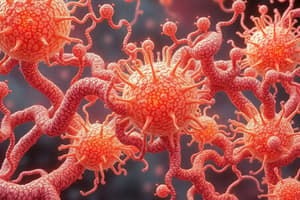Podcast
Questions and Answers
What is the main function of the circulatory system?
What is the main function of the circulatory system?
- Transporting materials (correct)
- Digestion
- Respiration
- Excretion
Which of the following is a cellular constituent of blood?
Which of the following is a cellular constituent of blood?
- Red blood cells (correct)
- Platelets
- Plasma
- Hemoglobin
What is the main function of platelets in the blood?
What is the main function of platelets in the blood?
- Carrying oxygen
- Producing antibodies
- Carrying nutrients
- Clotting (correct)
Which part of the body has the cardiac cell types and the cardiac cycle?
Which part of the body has the cardiac cell types and the cardiac cycle?
What is responsible for regulating blood pressure?
What is responsible for regulating blood pressure?
Which component of the circulatory system acts as a transport medium?
Which component of the circulatory system acts as a transport medium?
What is the composition of blood mainly responsible for?
What is the composition of blood mainly responsible for?
Which system is involved in the regulation of cardiac output and blood pressure?
Which system is involved in the regulation of cardiac output and blood pressure?
18
18
What is the location and gross anatomy of the heart responsible for?
What is the location and gross anatomy of the heart responsible for?
What is the main function of the circulatory system?
What is the main function of the circulatory system?
Which component of the blood is responsible for mediating blood clotting?
Which component of the blood is responsible for mediating blood clotting?
What is the primary function of plasma in the blood?
What is the primary function of plasma in the blood?
Which of the following nutrients are carried by the circulatory system to organs and tissues?
Which of the following nutrients are carried by the circulatory system to organs and tissues?
What is the approximate total volume of blood in the human body?
What is the approximate total volume of blood in the human body?
What is the main function of white blood cells in the blood?
What is the main function of white blood cells in the blood?
What is the primary role of the heart in the circulatory system?
What is the primary role of the heart in the circulatory system?
What triggers the rhythmic pumping action of the heart?
What triggers the rhythmic pumping action of the heart?
During which phase does ventricular contraction and emptying occur?
During which phase does ventricular contraction and emptying occur?
What is the main function of arteries in the circulatory system?
What is the main function of arteries in the circulatory system?
Which layer of the blood vessel walls is composed of smooth muscle?
Which layer of the blood vessel walls is composed of smooth muscle?
What is the name for the smaller branches of arterioles within organs?
What is the name for the smaller branches of arterioles within organs?
Which type of arteries expand when the pressure of the blood rises and act as a recoil system when the ventricles relax?
Which type of arteries expand when the pressure of the blood rises and act as a recoil system when the ventricles relax?
What causes the 1st heart sound (lub) heard at the start of ventricular contraction?
What causes the 1st heart sound (lub) heard at the start of ventricular contraction?
When do you hear the 2nd heart sound (dub) in early diastole?
When do you hear the 2nd heart sound (dub) in early diastole?
3
3
Qweqweqwe
Qweqweqwe
Wqeqwe
Wqeqwe
Wqeqweqwe
Wqeqweqwe
Qweqweqwe
Qweqweqwe
What is the primary purpose of the absolute or effective refractory period (ARP/ERP) in cardiac cells?
What is the primary purpose of the absolute or effective refractory period (ARP/ERP) in cardiac cells?
Which cells recover excitability faster than slow response cells during the refractory periods?
Which cells recover excitability faster than slow response cells during the refractory periods?
What does automaticity refer to in the context of cardiac cells?
What does automaticity refer to in the context of cardiac cells?
Which of the following represents normal cardiac automatic or pacemaker cells?
Which of the following represents normal cardiac automatic or pacemaker cells?
What triggers the electrical activity in the heart, followed by activation of the atria, AV node, and ventricles?
What triggers the electrical activity in the heart, followed by activation of the atria, AV node, and ventricles?
What is the main purpose of an electrocardiogram (ECG)?
What is the main purpose of an electrocardiogram (ECG)?
What does the P wave represent in an electrocardiogram (ECG)?
What does the P wave represent in an electrocardiogram (ECG)?
What initiates muscle contraction by allowing actin and myosin to slide past each other?
What initiates muscle contraction by allowing actin and myosin to slide past each other?
What is the main function of arterioles in the circulatory system?
What is the main function of arterioles in the circulatory system?
Which type of capillary has larger holes in addition to narrow pores, providing greater permeability?
Which type of capillary has larger holes in addition to narrow pores, providing greater permeability?
What serves as blood reservoir or capacitance vessels in the circulatory system?
What serves as blood reservoir or capacitance vessels in the circulatory system?
What is the main factor responsible for bulk flow ultrafiltration and reabsorption of protein-free plasma in capillaries?
What is the main factor responsible for bulk flow ultrafiltration and reabsorption of protein-free plasma in capillaries?
What anatomical feature ensures blood flow toward the heart in the venous system?
What anatomical feature ensures blood flow toward the heart in the venous system?
What is responsible for adjusting vessel radius supplying individual organs in the systemic circulation?
What is responsible for adjusting vessel radius supplying individual organs in the systemic circulation?
Which component regulates blood flow via capillaries in organs?
Which component regulates blood flow via capillaries in organs?
What is the main function of precapillary sphincters in the circulatory system?
What is the main function of precapillary sphincters in the circulatory system?
Study Notes
- The text is from a MPharm (Master of Pharmacy) Programme module named "The Circulatory System" taught by Dr. G. Boachie-Ansah.
- The topic of Week 19 was "Refractory Periods, Automaticity, and Electrical Activity of the Heart."
- Cardiac cells have refractory periods to prevent premature excitation and tetany.
- Absolute or effective refractory period (ARP/ERP) and relative refractory period (RRP) are two types of refractory periods.
- Fast response cells recover excitability faster than slow response cells, and slower recovery of excitability increases the risk of conduction block.
- Automaticity is the ability of some cardiac cells to initiate action potentials spontaneously, known as pacemaker activity.
- Normal cardiac automatic or pacemaker cells are the SA node, AV node, and specialized conducting tissue like the His-Purkinje system.
- Primary pacemakers, latent or subsidiary pacemakers, intrinsic and extrinsic control of automaticity are related concepts in automaticity.
- The heart beats rhythmically throughout life due to the spread of action potentials across muscle cell membranes.
- The heart's electrical activity is initiated by the electrical or autorhythmic cells.
- The SA node triggers the electrical activity, followed by the atria, AV node, bundle of His, and Purkinje fibres, which then activate the ventricles.
- The electrocardiogram (ECG) is a test that detects and records the electrical activity of the heart.
- ECG records the electrical currents generated during depolarization and repolarization.
- The standard ECG recording consists of six limb leads (I-III, aVR, aVL, and aVF) and six chest leads (V1-V6).
- The P wave represents atrial depolarization, the QRS complex represents ventricular depolarization, and the T wave represents ventricular repolarization.
- The cardiac muscle consists of muscle fibres, which form a functional syncytium.
- Muscle mass forms a functional syncytium, and individual cardiac muscle cells are interconnected with one another.
- Two types of membrane junctions are present within an intercalated disc: desmosomes (cell to cell anchoring junctions) and gap junctions (cell to cell communication junctions).
- Excitation contraction coupling is the sequence of events that leads to muscle contraction.
- The electrical signal from the action potential travels through the T-tubules, reaches the sarcoplasmic reticulum, and releases calcium ions.
- Calcium ions bind to troponin C, allowing actin and myosin to slide past each other, resulting in muscle contraction.
- The structure of cardiac muscle includes various components like fibres, intercalated discs, T-tubules, and sarcoplasmic reticulum.
Studying That Suits You
Use AI to generate personalized quizzes and flashcards to suit your learning preferences.
Related Documents
Description
Explore the components, functions, and anatomy of the circulatory system in this MPharm PHA112 lecture series. Delve into the composition of blood, cardiac cell types, and more under the guidance of Dr. G Boachie-Ansah.





